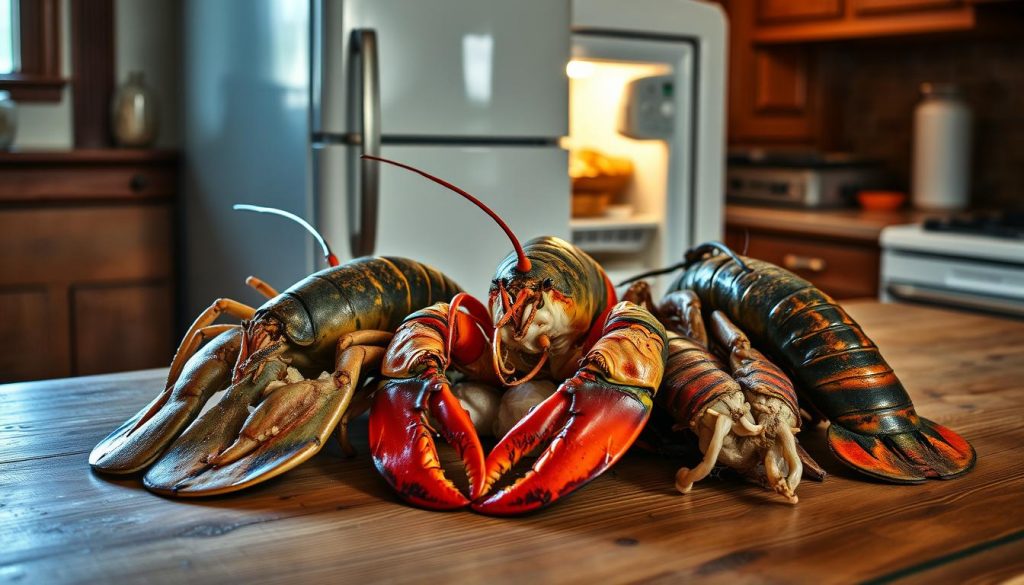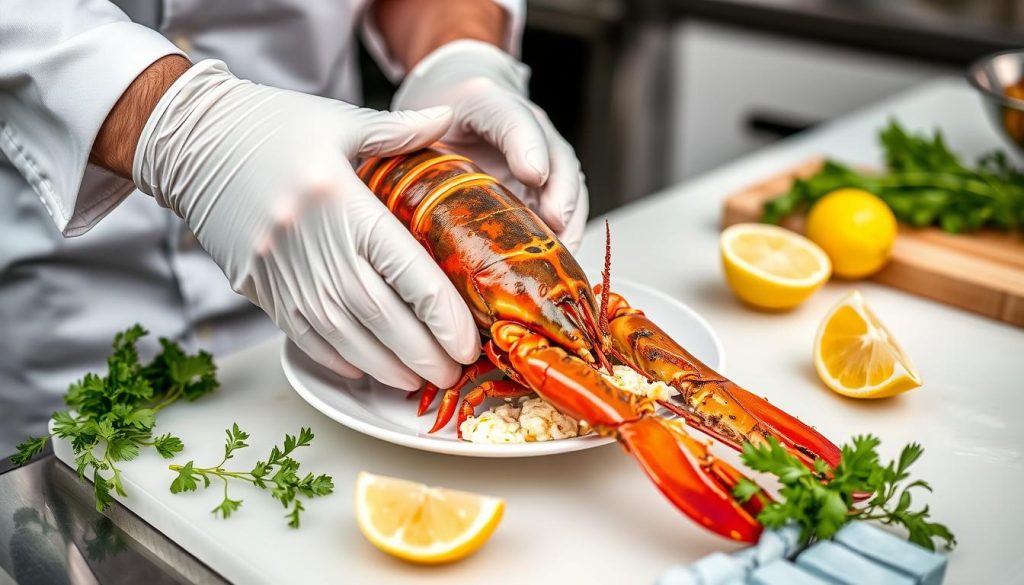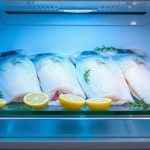Storing lobster can be challenging. We’ll help you keep your lobster fresh. Proper refrigeration is vital for quality and safety of live or cooked lobster.
Live lobsters stay fresh for up to two days in the fridge. It’s best to cook them within 24-48 hours of buying. Cooked lobster lasts 3-4 days when refrigerated properly.
Let’s explore the best ways to store lobster. We’ll cover temperature control and handling tips. This guide will help you enjoy your seafood to the fullest.
Key Takeaways
- Live lobsters can be stored in the fridge for up to 48 hours
- Cook live lobsters within 24-48 hours of purchase for best quality
- Cooked lobster lasts 3-4 days in the refrigerator
- Proper temperature control is crucial for lobster storage
- Never store live lobsters in tap water or airtight containers
- Look for signs of spoilage before cooking or consuming lobster
Understanding Fresh Lobster Basics
Maine lobster is prized for its sweet, succulent meat. Quality lobsters offer the best taste experience. Let’s explore how to spot fresh seafood indicators.
What Makes Quality Lobster
Quality lobsters are lively and responsive. Look for raised claws and curled tails. These are signs of a healthy crustacean.
The shell should be intact and free from blemishes. Lobster quality directly impacts taste and texture.
Signs of Fresh Lobster
Fresh lobsters show clear signs of life. They should move when touched and have a strong, sea-like smell.
Avoid lobsters with drooping claws or straight tails. These may indicate poor health or death.
Importance of Proper Storage
Proper storage keeps lobsters fresh. Keep live lobsters at 38°F to 40°F with 90-95% humidity.
This environment mimics their natural habitat. It keeps them fresh for 24-48 hours.
Don’t store lobsters in fresh water. It can be fatal to them.
| Storage Factor | Optimal Condition |
|---|---|
| Temperature | 38°F to 40°F (3°C to 4°C) |
| Humidity | 90-95% |
| Duration | 24-48 hours |
Knowing these fresh seafood indicators helps you pick great lobsters. You’ll be ready to select high-quality Maine lobster for your next meal.
Initial Handling of Live Lobsters
Proper seafood handling is vital for live lobster care. Gently open your package and check for lobster movement. Active lobsters are a good sign of freshness.
For short-term storage, wrap lobsters in damp newspaper or seaweed. Place them in the coldest part of your fridge, between 40°F to 45°F. Lobsters can survive out of water for 36 to 40 hours when stored right.
Handle lobsters carefully to reduce stress during transportation. Grasp the body, not the claws or tail. This prevents injury and keeps lobsters in prime condition for cooking.
“Proper handling is key to maintaining lobster quality. Treat them gently, keep them cool, and they’ll reward you with delicious flavor.”
| Storage Method | Duration | Temperature |
|---|---|---|
| Refrigeration (Live) | 24-48 hours | 40°F to 45°F |
| Cooked (Refrigerated) | Up to 3 days | 40°F or below |
| Meat Only (Refrigerated) | Up to 4 days | 40°F or below |
Follow these tips to keep your lobsters fresh until cooking time. Never store live lobsters in freshwater or freeze them. This can harm their quality and flavor.
How Long Does Lobster Last in the Fridge
Lobster shelf life is key to enjoying this tasty seafood. Let’s look at how long refrigerated lobster stays fresh. We’ll also cover signs of spoilage.
Optimal Storage Time for Live Lobsters
Live lobsters don’t last long out of water. In cool, damp places, they survive 36 to 40 hours. Properly refrigerated, live lobsters stay good for 24-48 hours.

Storage Duration for Cooked Lobster
Cooked lobster lasts longer in storage. In airtight containers, cooked lobster meat keeps 3-4 days in the fridge. For longer storage, try freezing.
Frozen cooked lobster stays tasty for up to nine months.
Signs of Spoilage
Knowing spoilage signs is crucial for safety. Fresh lobster should smell mildly like the ocean. Toss the lobster if it smells bad, looks discolored, or feels slimy.
These signs mean the lobster has gone bad. It’s no longer safe to eat.
| Lobster Type | Refrigerator Storage | Freezer Storage |
|---|---|---|
| Live Lobster | 24-48 hours | Not recommended |
| Cooked Lobster (in shell) | 3-4 days | Up to 9 months |
| Cooked Lobster Meat | 3-4 days | Up to 9 months |
Good storage keeps lobster fresh. Keep refrigerated lobster at a steady temperature. Use it within the suggested time for best taste and safety.
Proper Storage Container Selection
Picking the right lobster storage containers is vital for freshness. Let’s explore the best seafood packaging options. We’ll also highlight why ventilation matters for your crustacean friends.
Best Container Types
Open containers work best for live lobsters. Cardboard boxes, lobster pots, and thick paper bags are top choices. These options allow air to circulate, keeping lobsters in prime condition.
Avoiding Airtight Containers
Never use sealed bags or airtight containers for live lobsters. These limit airflow and can cause rapid spoilage. Remember, lobsters need to breathe like any other living creature.
Proper Ventilation Requirements
Ventilation is crucial in seafood packaging. Your storage solution should have enough holes for air circulation. This prevents moisture buildup and keeps lobsters fresh for longer.
| Container Type | Ventilation | Suitable for Live Lobsters |
|---|---|---|
| Cardboard Box | Good | Yes |
| Lobster Pot | Excellent | Yes |
| Paper Bag | Fair | Yes |
| Plastic Container (with holes) | Good | Yes |
| Sealed Plastic Bag | Poor | No |
Choose a storage container with good ventilation to keep lobsters fresh. A well-aired environment is key to maintaining seafood quality. Your lobsters will stay lively until it’s time to cook them.
Temperature and Moisture Control
Keeping lobsters fresh requires proper temperature and humidity control. Set your fridge between 32°F and 40°F for best results. Store lobsters on the lowest shelf at the back or in the meat keeper.
Humidity is key for lobster storage. Cover them with damp newspaper or fresh seaweed to maintain moisture. This method mimics their natural habitat and keeps them in good condition.
| Storage Type | Temperature Range | Humidity Level | Shelf Life |
|---|---|---|---|
| Live Lobster | 32°F – 40°F | 85-90% | 24-48 hours |
| Cooked Lobster | 32°F – 36°F | 85-90% | 3-4 days |
Don’t store lobsters in freshwater or the freezer. Freshwater harms their saltwater balance, while freezing can damage their cells. Use a ventilated container for refrigeration to ensure proper air circulation.
This approach creates the right environment for your lobsters. It extends their shelf life and keeps their taste delicious.
Safe Handling Practices
Handling live lobsters requires care to ensure safety. Learn essential techniques to manage lobster claws and tails. These methods will keep both you and the lobster safe.
Handling Live Lobsters
Grip the lobster’s body firmly behind the claws. This prevents unexpected movements and keeps you safe. Be ready for quick reactions, as the tail can curl suddenly.

Using Rubber Bands
Rubber bands on lobster claws are crucial for safety. Keep them on until after cooking. This simple step greatly reduces the risk of painful pinches.
Safety Precautions
Watch out for the tail’s sharp edges when handling lobsters. Limit handling time to minimize stress on the lobster. A calm lobster is easier and safer to manage.
| Body Part | Handling Technique | Safety Tip |
|---|---|---|
| Claws | Grip behind | Keep rubber bands on |
| Tail | Support from below | Watch for sharp edges |
| Body | Firm hold | Minimize handling time |
These techniques will help you prepare lobster safely. Practice will improve your lobster handling skills. Enjoy your lobster feast with confidence!
Common Storage Mistakes to Avoid
Lobster care errors can ruin your seafood. Let’s explore some storage pitfalls and how to avoid them. This will help you keep your lobsters fresh and tasty.
Fresh Water Exposure
Exposing live lobsters to fresh water is a big mistake. It disrupts their saltwater balance and can be fatal. Use seawater or damp seaweed to keep them moist instead.
Temperature Fluctuations
Keeping a steady temperature is vital. Store lobsters at around 40°F. Don’t freeze live lobsters as it can damage their cells.
Keep them in the fridge, but not for more than 24-48 hours. This ensures they stay fresh for cooking.
Improper Packaging
Avoid storing lobsters in airtight containers or plastic bags. They need proper ventilation to survive. Wrap them in damp paper instead.
Place them on the bottom shelf of your fridge. This spot provides the right conditions for storage.
| Storage Method | Duration |
|---|---|
| Live lobster in fridge | 1-2 days |
| Cooked lobster in fridge | 3-4 days |
| Cooked lobster in freezer | Up to 2 months |
Break down fresh-killed lobsters before storing to prevent mushy tails. Avoid these storage mistakes to keep your lobsters fresh. Your next seafood feast will be delicious!
Commercial Storage Solutions
Proper commercial seafood storage is vital for businesses handling live lobsters. Quality restaurant lobster care ensures freshness. Investing in the right equipment and following best practices is crucial.
Lobster tanks are essential for commercial lobster storage. They need excellent filtration to keep water clean and healthy. Only use salted water, as lobsters can’t survive in fresh water.
Regular tank maintenance is key to ensuring lobster health and quality. This helps maintain the freshness of your seafood inventory.
Consider these factors when setting up commercial seafood storage:
- Choose tanks made of materials resistant to mold and breakage
- Install a backup power system to prevent losses during outages
- Maintain water temperature between 40-50°F
- Monitor oxygen levels and salinity regularly
Proper storage can extend live lobster shelf life up to 1-2 weeks. This allows businesses to buy low and sell high. Regular checks are essential, as serving dead lobsters is unsafe.
Following these guidelines ensures top-notch lobster care for restaurants and seafood businesses. It maintains product quality and satisfies customer demand.
Preparing Stored Lobster for Cooking
Cooking fresh lobster can be challenging, but it’s easy with the right know-how. Let’s explore how to prepare stored lobster for a tasty meal.
Thawing Methods
Thawing seafood requires patience. For frozen lobster, slow thawing in the refrigerator works best. This method preserves the lobster’s texture and flavor.
Pre-cooking Preparation
Check live lobsters for signs of vitality before cooking. Chill them in the freezer for about 30 minutes to make handling easier.
This brief cold exposure slows them down without freezing the meat.
Quality Check Before Cooking
Always do a final quality check before cooking. Look for responsive live lobsters and check for any odd smells.
Thawed lobster meat should be firm and smell fresh like the ocean. Remove claw rubber bands just before cooking to avoid any rubber taste.
| Storage Type | Maximum Storage Time | Recommended Cooking Time |
|---|---|---|
| Live Lobster (Refrigerated) | 24 hours | 13-17 minutes (depending on size) |
| Cooked Lobster (Refrigerated) | 3 days | N/A (already cooked) |
| Frozen Uncooked Lobster Meat | 6 months | 5 minutes in boiling water before freezing |
Follow these tips to create a delicious lobster dish that will wow your guests. Proper storage and careful prep are key to perfect lobster.
Conclusion
Proper lobster storage is crucial for maintaining seafood freshness. Live lobsters should be cooked within 24 hours of purchase. Cooked lobster can last up to three days in the fridge.
Temperature control is vital for lobster storage. Keep live lobsters between 35º and 45ºF. Freeze cooked lobster meat for up to six months for long-term storage.
Cooking times depend on the lobster’s size. Boiling or steaming can take 7 to 17 minutes based on weight. Following these guidelines ensures a safe and tasty lobster experience.
Correct handling and preparation techniques bring out the best in lobster. By using these tips, you’ll enjoy rich flavors and an elevated seafood dining experience.




